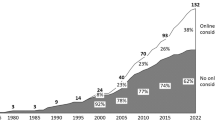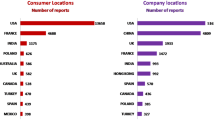Abstract
Price-Matching Guarantees (PMGs) are a mechanism by which retailers can reassure consumers of the competitive price of products they offer. While current research in marketing has studied consumers’ pre-purchase perceptions of the retailer as a result of offering price-matching guarantees, research on the post-purchase impact of PMGs has been relatively limited. While price-matching guarantees are typically assumed to result in positive consumer perceptions of the retailer, no study to date has examined the potentially negative post-purchase impact of PMGs. This paper examines the potential negative effect of policy restrictions which may prevent the disbursement of a price-matching refund, on consumer perceptions. Two experiments (Experiment 1 n = 120, Experiment 2 n = 50) are utilized to dissect the impact of policy restrictions on consumers’ perceptions of service quality, price, and loyalty. The paper concludes with a discussion of the managerial implications of the findings on price-matching guarantee policies.


Similar content being viewed by others
References
Adams, B. (2002). Low price guarantee creates confidence. Hotel and Motel Management, 217(16), 1, 74.
Biswas, A., Pullig, C., Mehmet, I. Y., & Dwane, H. D. (2002). Consumer evaluation of low price guarantees: The moderating role of reference prices and store image. Journal of Consumer Psychology, 12(2), 107–118.
Bitner, M. J., Booms, B., & Tetreault, M. (1990). The service encounter: Diagnosing favorable and unfavorable incidents. Journal of Marketing, 54, 71–84.
Boulding, W., & Kirmani, A. (1993). A consumer-side experimental examination of signaling theory: Do consumers perceive warranties as signals of quality? Journal of Consumer Research, 20, 111–123, (June).
Campbell, M., & Goodstein, R. (2001). The moderating effect of perceived risk on consumers’ evaluations of product incongruity: Preferences for the norm. Journal of Consumer Research, 28, 439–449, (December).
Corts, K. B. (1997). On the competitive effects of price-matching policies. International Journal of Industrial Organization, 15, 283–299, (May).
Estelami, H. (2003). Sources, characteristics, and dynamics of post-purchase price complaints. Journal of Business Research, 56(2), 411–419.
Estelami, H., & DeMaeyer, P. (2002). An exploratory study of customer reactions to service provider over-generosity. Journal of Service Research, 4(3), 205–217.
Folkes, V. S. (1988). Recent attribution research in consumer behavior: A review and new directions. Journal of Consumer Research, 14, 548–565, (March).
Grow, B., & Chhatwal, R. (2005). The great rebate runaround. Business Week, 3962(December), 34.
Kahneman, D., & Tversky, A. (1981). The Simulation heuristic. In D. Kahneman, P. Slovic & A. Tversky (Eds.), Judgment under uncertaintly: Heuristics and biases (pp. 201–208). New York: Cambridge University Press.
Kelley, S. W., Hoffman, K. D., & Mark, A. D. (1993). A typology of retail failures and recoveries. Journal of Retailing, 69(4), 429–452.
Kukar-Kinney, M., & Walters, G. R. (2003). Consumer perceptions of refund depth and competitive scope in price-matching guarantees: Effects on store patronage. Journal of Retailing, 79(3), 153–160.
Lassar, W., Dhruv, G., & Howard, M.(1999). Consumer responses to the timing of product breakdowns in the presence of manufacturers’ warranties. Journal of Business and Psychology, 14(2), 355–371.
Lichtenstein, D. R., & Bearden, W. O. (1988). An investigation of consumer evaluations of reference price discount claims. Journal of Business Research, 17(2), 189–200.
Lucas, P. (2001). The online shopping brawl. Credit Card Management, 14(4), 57–65.
Lutz, N. (1989). Warranties and signals under consumer moral hazard. Rand Journal of Economics, 20, 239–255, (Summer).
Maxham, J. G., & Netemeyer, R. G. (2002). A longitudinal study of complaining customers’ evaluations of multiple service failures and recovery efforts. Journal of Marketing, 66, 57–71, (October).
Png, I. P. L., & Hirshleifer, D. (1987). Price discrimination through offers to match price. Journal of Business, 60(3), 365–383.
Salop, S. C. (1986). Practices that (credibility) facilitates oligopoly coordination. In J. E. Stiglitz & G. F. Mathewson (Eds.), New Developments in the Analysis of Market Structure. Cambridge, MA: MIT Press.
Sivakumar, K., & Weigand, R. E. (1996). Price-matching guarantees: Rationale, implementation, and consumer response. Pricing Strategy and Practice, 4(4), 4–13.
Spence, M. (1974). Market-Signaling. Cambridge, MA: Harvard University Press.
Spence, M. (1977). Consumer misperceptions, product failures and producer liability. Review of Economic Studies, 44(3), 561–572.
Srivastava, J., & Lurie, N. (2001). A consumer perspective on price-matching refund policies: Effect on price perceptions and search behavior. Journal of Consumer Research, 28(2), 296–307.
Tax, S. S., Brown, S. W., & Chandrashekaran, M. (1998). Customer evaluations of service complaint experiences: Implications for relationship marketing. Journal of Marketing, 62, 60–76, (April).
Walster, E., Bershied, E., & Walster, G. W. (1973). New directions in equity research. Journal of Personality and Social Psychology, 29, 151–176, (February).
Weber, R. P. (1985). Basic content analysis. London: Sage.
Author information
Authors and Affiliations
Corresponding author
Additional information
All authors contributed equally to the paper and are listed in alphabetical order. This research has been supported by a research grant from the Fordham University Graduate School of Business, the Babson Board of Research, and the Marketing Science Institute.
Appendices
Appendix 1
Study 1: “Lowest Price Guarantee” at National Electronics Store
National Electronics Store is a retailer of home electronic products in your neighborhood. This retail store is part of a national retail chain with formal customer service policies. It is nationally recognized for outstanding customer service.
In the home electronics market, prices fluctuate a great deal from one store to the next. For the exact same item, prices might vary considerably, depending on where you buy it. For example, a $95 item can be found for $75 in one store and $149 in another store.
This store offers its buyers a “Lowest Price Guarantee.” Once you’ve purchased an item from them, if you find the same product at a lower price elsewhere, they will reimburse you for the difference in prices.
[collect price and service measures]
Due to necessity you decide to purchase an item from National Electronics Store. You pay $149 for the item. A couple of weeks later, while scanning the local shopping mall you happen to find the exact same item for $99 in some other store. You obtain a copy of the store information for the item, and on your way home stop by National Electronics Store to inquire why you paid a higher price and to ask for your “Lowest Price Guarantee.”
The employee at National Electronics Store asks to see the competing store’s price information, and then reimburses you for the full amount of the difference between the price you paid and the lower price you found at the competing store.
[collect price, service, and loyalty measures]
Appendix 2
Appendix 3
Study 2: “Lowest Price Guarantee” at National Computer Accessories
National Computer Accessories is a retailer of computer accessories (e.g., printers, modems, etc.) in your neighborhood. This retail store is part of a national retail chain with formal customer service policies. It is nationally recognized for outstanding customer service.
In the computer accessory market, prices are extremely unstable from one store to the next. For the exact same item, prices might vary considerably, depending on where you buy it. For example, a $95 item can be found for $35 in one store and $189 in another store.
This store offers its buyers a “30-Day Lowest Price Guarantee.” Once you’ve purchased an item from them, if you find the same product at a lower price elsewhere within 30-days, they will reimburse you for the difference in prices.
[collect price and service measures]
Due to necessity you decide to purchase an item from National Computer Accessories. You pay $149 for the item. Imagine that it is 29 days after you made your purchase at National Appliance Store, and that while scanning the local shopping mall you happen to find the exact same item available at another store for a price of $99. You obtain a copy of the store information for the item, and on your way home stop by National Computer Accessories to inquire why you paid a higher price and to ask for your “Lowest Price Guarantee.”
The employee at National Computer Accessories asks to see the competing store’s price, and then reimburses you for the full amount of the difference between the price you paid and the lower price you had found at the competing store.
[collect price, service, and loyalty measures]
Rights and permissions
About this article
Cite this article
Estelami, H., Grewal, D. & Roggeveen, A.L. The negative effect of policy restrictions on consumers’ post-purchase reactions to price-matching guarantees. J. of the Acad. Mark. Sci. 35, 208–219 (2007). https://doi.org/10.1007/s11747-007-0024-6
Published:
Issue Date:
DOI: https://doi.org/10.1007/s11747-007-0024-6




